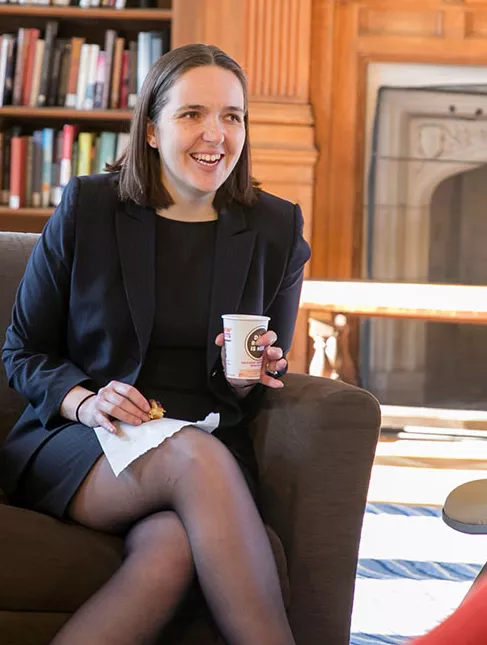
This fall, a quartet of alumnae came back to campus to meet with students as part of an Alumna-in-Residence program sponsored by the Leadership, Innovation, and Liberal Arts Center (LILAC). Each alumna spent a day speaking with small groups of students on such topics as graduate programs, the job hunt, work-life balance, and the definition of success. The program was piloted last spring with visits from Rebecca Katz ’96 from Vanguard, Alexis Baird ’05 from LinkedIn, and Aneesah Abkar-Uqdah ’07 from the Centers for Disease Control and Prevention.
“We want our alumnae to be open, honest, and accessible, not necessarily doing formal presentations,” says Katie Krimmel, associate dean for LILAC, “and students to come prepared with a willingness to have a conversation about their aspirations and concerns about their futures.”
Here’s a sampling of the kinds of conversations that took place and some words of advice from the alumnae:
BE OPEN TO HOW THINGS HAPPEN
“I’m deeply skeptical about the utility of a five- or 10-year plan,” said Kiki Jamieson ’88, president of the Fund for New Jersey, a private grant-making foundation. Instead, she encouraged students to work hard and to rely on their curiosity as a more enduring form of motivation. She urged them to say yes to new opportunities and cited her own pathway as an example: After graduating from Bryn Mawr with a political science degree, Jamieson spent three years in New York’s publishing industry before embarking on graduate school and a teaching career. But a move to Princeton’s Pace Center for Civic Engagement gave her the practice-based experience that would become the groundwork for her work at the Fund.
Looking back, each choice made sense at the time, but I could never have predicted that my path would lead me closer and closer to the policy-making arena and the work I love so much.
LEARN THE BASICS…WELL
Even with a well-established medical career, Melanie Cree Green ’99 is still learning new things—and still relying on techniques and methods she learned at Bryn Mawr. “I learned the strengths and weaknesses of methods and how to plan, document, and problem-solve,” says Green, a pediatric endocrinologist at Children’s Hospital of Colorado.
Bryn Mawr gave me a great foundation, and that makes all the difference in my work. In science, everything you do in one experiment is relevant to another, whether it’s biology or chemistry. You are always preparing for the next experiment.
STRATEGICALLY NETWORK
Megan Roudebush ’02 emphasized the importance of mentoring and networks. As a manager at Deloitte, she was involved in the firm’s women’s initiative, known as WIN, and planned a series of workshops focused on helping women develop executive presence. Roudebush told students to develop and execute a strategic networking plan:
Make a spreadsheet of people you know and people you want to know. Employ a give-and-take approach to networking. Reach out to contacts periodically and track your progress and when talking to members of your network, ask for the names of two new people you should know and add those contacts to your spreadsheet.
READ
Earlier this year, Amanda Preston ’09 became the senior manager of recruitment for Boston Public Schools, overseeing systems and policies for all teacher, principal, and headmaster positions in the district. When asked for advice on how to transition into a new role or organization, she said “read.” Specifically, know your organization’s history—what happened before you arrived—so you can understand its people, culture, policies, and path, all of which are vital to your success.
Read best practices for your industry and job, and reach out to your peers at other organizations to find out what they’re doing and to discuss trends. Read the important journals and periodicals. Read everything… it’s overwhelming but you can never know too much.